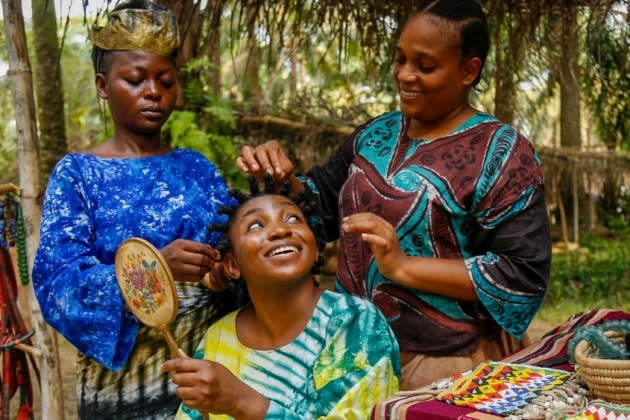EbonyLife’s Mo Abudu on Toronto Premiere ‘The King’s Horseman’ and Legacy of Late Director Biyi Bandele
- Oops!Something went wrong.Please try again later.
- Oops!Something went wrong.Please try again later.

The weeks leading up to a world premiere of a movie are typically a time of celebration and anticipation for the filmmakers, particularly when that premiere is taking place at the Toronto Film Festival. But for the team behind “Elesin Oba, The King’s Horseman,” which is produced by Mo Abudu’s EbonyLife Films and Netflix and screened in the festival’s Special Presentations section Sept. 10, there was a long shadow cast across the red carpet on opening night.
Just weeks ahead of the film’s world premiere, director Biyi Bandele died in Lagos, Nigeria. His sudden, tragic passing on the eve of what would have been his crowning achievement as a filmmaker sent shock waves through the film community, particularly in Africa and across the African diaspora.
More from Variety
When the news broke, TIFF CEO Cameron Bailey paid tribute to the director, writing in a Twitter post: “Biyi Bandele was doing something so rare in world cinema: large-scale adaptations of African literature meant for the whole world.” Executive producer Abudu described his passing as a “huge loss to all of us.”
“Biyi worked with such ease in the way and manner that he went about directing,” she told Variety. “We will miss that … and how he was able to understand the Yoruba culture, our traditions, those nuances that are truly Nigerian.”
“Elesin Oba, The King’s Horseman” was a passion project for the late director. Based on real-life events in Nigeria in 1943, it’s set in the Oyo Empire, in which the king’s horseman must commit ritual suicide to follow the deceased royal into the afterlife. His intentions, however, are derailed by sexual desire, leading to a deadly clash with the British authorities and forcing his spirit to roam the earth, spelling doom for the land and its people.

The film is based on the stage play “Death and the King’s Horseman,” which was written by Wole Soyinka, and is the first of the Nigerian Nobel Laureate’s works to be made into a feature film. It marks the second big-screen adaptation for Bandele, an acclaimed playwright and novelist who made his directorial debut with “Half of a Yellow Sun” — an adaptation of the 2006 novel by Nigerian writer Chimamanda Ngozi Adichie starring Chiwetel Ejiofor, Thandiwe Newton and Anika Noni Rose that premiered at Toronto in 2013.
Abudu acquired the rights to Soyinka’s play a decade ago but “spent the last 10 years trying to produce it, mainly due to the cost of production,” she said. Though her EbonyLife Media group, which began as a lifestyle pay-TV network in 2013, moved into feature film production during that time, it was only when Netflix came on board that she felt it possible to achieve the scale and scope the production demanded. “The rights were nearly up. And if not for Netflix, I probably wouldn’t have made it.”
The film is part of a multi-put deal Abudu inked with the streaming service in 2020. She described the platform as “true collaborators,” saying: “They’re trailblazing on the continent. They were the first ones to come to Africa three years ago to say that they were going to start investing in real, authentic Nigerian stories — stories told by us, written by us and directed by us.”
For “The King’s Horseman,” Abudu enlisted Bandele, who directed the EbonyLife feature film “Fifty” and co-directed the company’s Netflix series “Blood Sisters,” and who shared her vision of staying faithful to both Yoruba tradition and Soyinka’s acclaimed play. Production designer Surisa Surisa, whose credits include STX’s “The Mauritanian” and Warner Bros.’ “Mad Max: Fury Road,” helped to recreate the colonial era in a way Abudu described as “colorful, textured, extremely rich.”
It was at Bandele’s prodding, however, that the production team made its boldest choice: to deviate from the original text and shoot the film almost entirely in the Yoruba language. Bandele said in a director’s note that he considered “Death and the King’s Horseman” to be “the most deeply and fundamentally Yoruba of all Soyinka’s plays,” so much so that translating it from English, through the work of writer and translator Kola Tubosun, was “the only way to make the film immediately accessible to a global audience.”
It’s that attention to detail, and the passion of Bandele’s convictions, that Abudu said will be sorely missed. “He has left a huge legacy behind, based on his written work, based on the films he’s directed,” she said. “‘Death and the King’s Horseman’ is such an important piece of IP for us in Nigeria, for literature, for those who love the arts, for many people. It’s the first time that this is being made into a feature film. It’s a real legacy that Biyi was able to write the adaptation, and it’s a real legacy that he was able to direct this work.”
Best of Variety
Sign up for Variety’s Newsletter. For the latest news, follow us on Facebook, Twitter, and Instagram.

